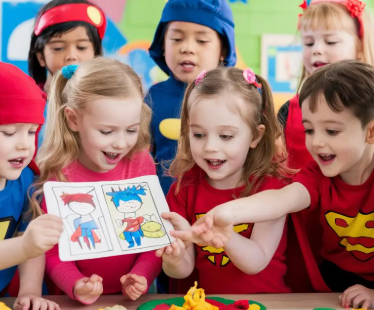Building positive habits within a team can often feel like a challenge, but introducing fun activities that everyone can enjoy makes the process seamless and even exciting. Team activities not only bring people closer together but also create an environment where healthy routines and constructive behaviors naturally develop. When employees or group members engage in enjoyable tasks, the repetition of positive behaviors is more likely to stick, turning simple actions into lasting habits.
A great starting point is encouraging regular physical activity as part of team interaction. This doesn’t have to mean rigorous workouts; simple, enjoyable games that involve movement can work wonders. For instance, teams can organize short daily walking challenges, where groups compete to accumulate steps over the week. Walking together not only promotes physical health but also strengthens interpersonal relationships, giving participants a sense of shared accomplishment. Over time, these walks can become a natural part of the day, encouraging both movement and social bonding simultaneously.
Another engaging activity is team cooking or healthy eating challenges. Preparing meals together, whether in a workplace kitchen or at home for remote teams, fosters collaboration while emphasizing the value of nutritious food choices. Groups can share recipes, try new ingredients, or compete to create the most colorful and balanced meal. These activities subtly instill good dietary habits, encouraging participants to think about nutrition in a fun and interactive way. As teams continue these culinary sessions, members often find themselves naturally integrating healthier meals into their daily routines without feeling pressured.
Team-based mindfulness and relaxation exercises can also promote positive habits. Activities such as guided meditation sessions, group breathing exercises, or even creative relaxation workshops help participants manage stress and develop emotional resilience. Doing these exercises together creates a supportive atmosphere where individuals feel comfortable exploring new ways to maintain mental well-being. As these practices become routine, teams experience a boost in both productivity and overall satisfaction, with mindfulness transforming from a simple activity into a lasting habit.
Collaborative goal-setting games are another powerful tool. Teams can set collective objectives, such as completing a certain number of community service hours, improving sustainability practices in the workplace, or reaching personal wellness milestones. By framing these goals as fun challenges, teams create a sense of purpose and shared responsibility. Regularly tracking progress and celebrating achievements together reinforces motivation and helps embed consistent behaviors. Over time, team members begin to internalize the value of setting and pursuing goals, which can extend beyond the workplace or organized activity.
Outdoor adventures provide a unique opportunity for teams to adopt positive habits in an immersive and exciting way. Activities like hiking, cycling, or scavenger hunts require communication, cooperation, and physical effort. By enjoying nature and facing challenges together, teams strengthen their problem-solving skills while naturally incorporating movement and teamwork into their routine. The fun and memorable experiences created during these outings leave a lasting impression, inspiring participants to continue pursuing active and healthy habits in their daily lives.
In addition to physical and outdoor activities, creative group challenges help cultivate mental agility and collaborative habits. Problem-solving games, escape room simulations, and creative brainstorming exercises encourage innovative thinking and effective communication. By regularly participating in these activities, teams learn to approach challenges with a positive mindset, reinforcing resilience and adaptability as everyday habits. The shared excitement of solving problems together also strengthens team cohesion and builds trust, creating an environment where positive behaviors flourish.
Regular social responsibility projects can be another avenue for promoting good habits. Volunteering as a team or organizing charity drives encourages empathy, community engagement, and consistent contribution to meaningful causes. These activities allow team members to develop a habit of helping others while enhancing social awareness and teamwork skills. Celebrating the impact of these initiatives together provides motivation to continue participating in community-oriented actions, turning one-time efforts into ongoing habits that benefit both the team and society.
Reflection and feedback exercises also play an important role in embedding positive behaviors. Encouraging teams to regularly share their experiences, discuss successes, and identify areas for improvement creates a culture of continuous learning. Activities like journaling reflections after team exercises or group discussions about healthy habits help individuals internalize lessons and commit to consistent personal growth. Over time, these reflective practices become a natural component of team life, supporting the ongoing development of positive routines.
Incorporating small, enjoyable rituals into the team’s daily schedule reinforces the impact of these activities. Whether it’s starting each day with a short motivational session, celebrating weekly achievements, or taking short breaks for light-hearted games, these repeated actions help normalize positive habits. When these routines are consistent and fun, they are more likely to be embraced by all team members, creating a lasting culture of positivity and well-being.
Ultimately, fun team activities are a powerful tool for nurturing positive habits. They transform routine behaviors into engaging experiences, strengthen relationships, and create a supportive environment where everyone is motivated to grow. By combining physical activity, creative challenges, mindfulness exercises, goal setting, and social responsibility, teams can cultivate habits that benefit both individuals and the group as a whole. These enjoyable experiences not only make everyday actions more rewarding but also establish a foundation for sustained personal and collective well-being.
Through thoughtful planning and consistent participation in these activities, teams can develop a culture where positive habits are naturally integrated into daily life. The sense of accomplishment, connection, and enjoyment that comes from working together to achieve common goals ensures that these behaviors are more than temporary—they become enduring parts of a team’s identity. Fun team activities do more than entertain; they inspire, motivate, and guide individuals toward lasting habits that enhance health, happiness, and collaboration.














